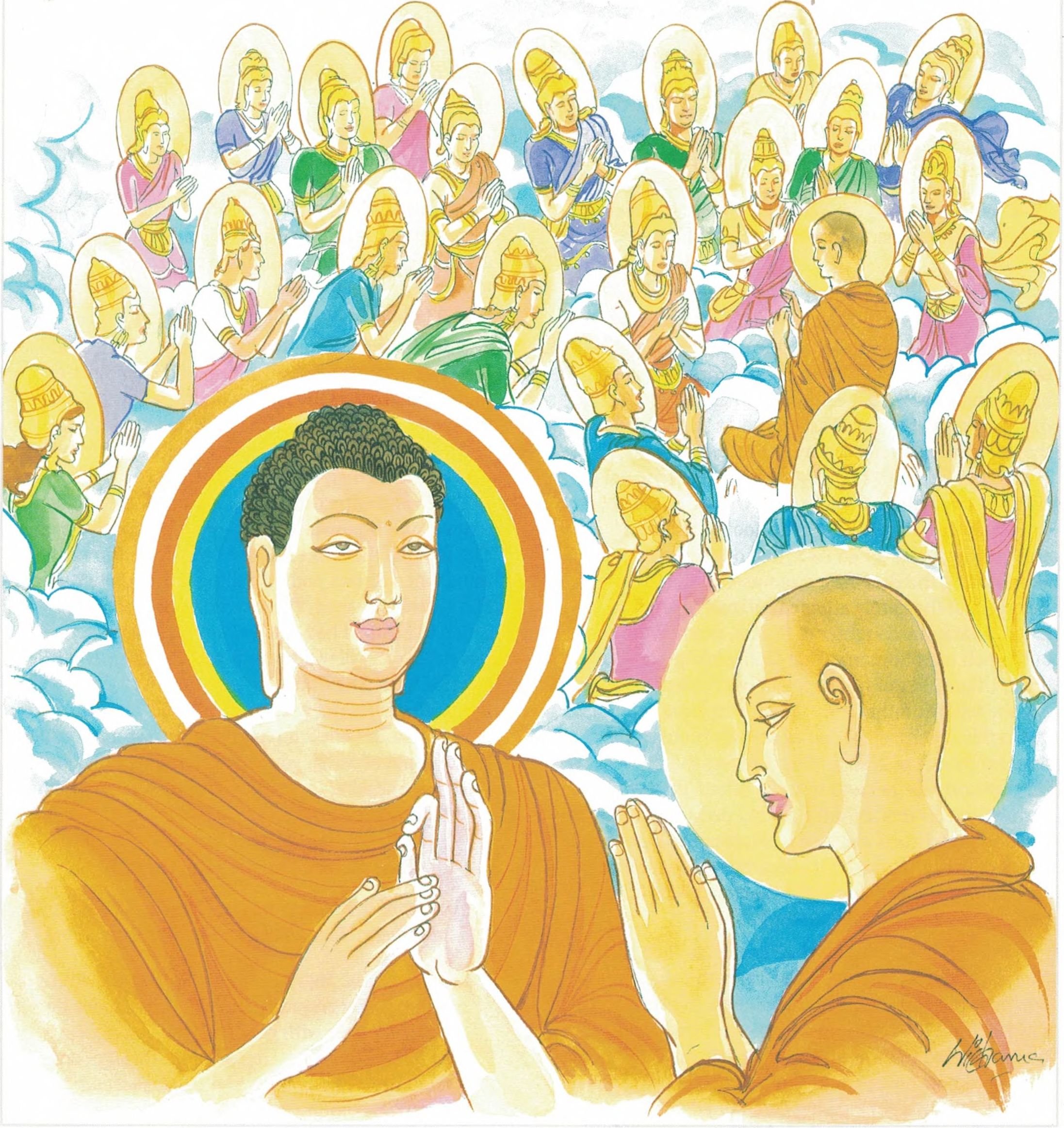Dhammapada (Illustrated)
by Ven. Weagoda Sarada Maha Thero | 1993 | 341,201 words | ISBN-10: 9810049382 | ISBN-13: 9789810049386
This page describes The Story of the Question Raised by Venerable Maha Moggallana which is verse 224 of the English translation of the Dhammapada which forms a part of the Sutta Pitaka of the Buddhist canon of literature. Presenting the fundamental basics of the Buddhist way of life, the Dhammapada is a collection of 423 stanzas. This verse 224 is part of the Kodha Vagga (Anger) and the moral of the story is “In speech be true, feel no anger. Give even out of a little when asked. This is the godly way”.
Verse 224 - The Story of the Question Raised by Venerable Mahā Moggallāna
Pali text, illustration and English translation of Dhammapada verse 224:
saccaṃ bhaṇe na kujjheyya dajjāppasmiṃ'pi yācito |
etehi tīhi ṭhānehi gacche devāna santike || 224 ||
224. Speak truth and be not angry, from little give to one who asks, by these conditions three to go unto the prescence of the gods.
 In speech be true, feel no anger. Give even out of a little when asked. This is the godly way. |
The Story of the Question Raised by Venerable Mahā Moggallāna
While residing at the Jetavana Monastery, the Buddha spoke this verse with reference to the question raised by Venerable Mahā Moggallāna.
Once, Venerable Mahā Moggallāna visited the deva world and found many devas living in luxurious mansions. He asked them for what good deed they were reborn in the deva world and they gave him different answers. One of them was reborn in the deva world not because he gave away much wealth in charity or because he had listened to the Dhamma, but just because he always spoke the truth. The second one was a female deva who was reborn in the deva world because she did not get angry with her master and had no ill will towards him even though he often beat her and abused her. For keeping her temper and abandoning hatred she was reborn in the deva world. Then, there were others who were reborn in the deva world because they had offered little things like a stick of sugar cane, a fruit, or some vegetables to a monk or to someone else.
On his return from the deva world, Venerable Mahā Moggallāna asked the Buddha whether it was possible to gain such great benefits by just speaking the truth, or by restraining one’s actions, or by giving small amounts of such trifling things like fruits and vegetables. To him the Buddha answered, “My son, why do you ask? Have you not seen for yourself and heard what the devas said? You should not have any doubt. Little deeds of merit surely lead one to the world of the devas.”
Explanatory Translation (Verse 224)
saccaṃ bhaṇe na kujjheyya yācito āppasmiṃ api
dajjā etehi tīhi ṭhānehi devānaṃ santike gacche
saccaṃ [sacca]: the truth; bhaṇe: speak; na kujjheyya: do not get angry; yācito [yācita]: when asked; āppasmiṃ api: even a little; dajjā: give; etehi: in these; tīhi ṭhānehi: three factors; devānaṃ santike: to the presence of gods; gacche: reach
Speak the truth. Do not get angry. When asked, give even a modicum. These three factors will ensure that you will reach the deities.
Commentary and exegetical material (Verse 224)
na kujjheyya: do not get angry. Krodha (anger) is the harshness that arises in some minds. The feeling of anger tends to fluctuate, especially as it escalates through a variety of stages. The process of destabilization of a human being that comes about with the onset of anger, escalates from an initial disturbance of mind until it climaxes in the disastrous use of weapons. This kind of anger may, at times, end with loss of life–either one’s own or someone else’s.
The traditional commentary has this to say about the ways of anger:
kodhano dubbannohoti–atho dukkhampi seti so
atho attham gahetāvna–anattham adhigacchati.(The person given to anger will suffer less of complexion, how well he eats or drinks. Though he sits down and lies down in luxury, he is full of misery. He slides into deterioration while looking on at profitable, wholesome things.)
tato kāyena vācāya–vadham katvāna kodhano
kodhābhibhūto puriso–dhanajānim nigacchūti.(The person who is caught in the grip of anger will destroy life physically, verbally and mentally. In the end, he will suffer erosion of wealth, destroying life.)
dummankuyaṃsa dassetā–dhūmaggiviya pāvako
yato patāyati kodho–yena kujjhanti mānavā.(Once angered his face is deformed like a smouldering fire. Whatever the cause of anger, once angered men and women are shameless. The words they utter are incoherent and meaningless. A person in anger is totally helpless.)
